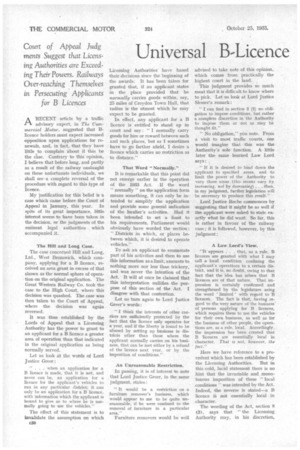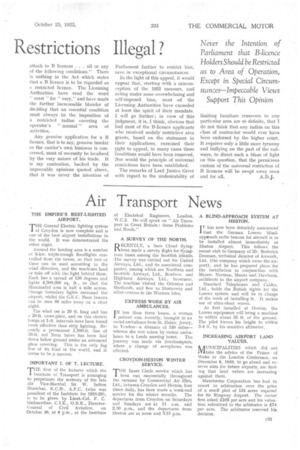Universal B-Licence Restrictions Illegal?
Page 72

Page 73

If you've noticed an error in this article please click here to report it so we can fix it.
Court of Appeal Judg ments Suggest that Licensing Authorities are Exceeding Their Powers. Railways Over-reaching Themselves in Persecuting Applicants for B Licences
ARECENT article by a traffic advisory expert, in The Commercial Motor, suggested that Blicence holders must expect increased opposition upon applications for renewals, and, in fact, that they have little to complain about if this be the case. Contrary to this opinion, I believe that before long, and partly as a result of the railway onslaught on these unfortunate individuals, we shall see-a complete reversal of the procedure with regard to this type of licence.
My justification for this belief is a case which came before the Court of Appeal in January, this year. In spite of its great importance, little interest seems to have boon taken in the decision, or the judgments of the eminent legal authorities which accompanied it.
The Hill and Long Case.
The case concerned Hill and Long, Ltd., West Bromwich, which company, applying for a B licence, received an area grant in excess of that shown as the normal sphere of operation on the original application. The Great Western Railway Co. took the case to the High Court, where this decision was quashed. The case was then taken to the Court of Appeal, where the decision Was again reversed.
It was thus established by the Lords of Appeal that a Licensing Authority has the power to grant to an applicant for a B licence a greater area of operation than that indicated in the original application as being normally served.
Let us look at the words of Lord justice Greer: an application for a B licence is made, that it is not, and never can be, an application for a licence for the applicant's vehicles to run in any particular district: it can only, be an application for a B licence, with information which the applicant is bound to give as to where he is normally going to use the vehicles."
• The effect of this statement is to invalidate the assumption on which C80
Licensing Authorities have based their decisions since the beginning of the awards. It has been taken for granted that, if an applicant states in the place provided that he normally carries goods within, say, 25 miles of Croydon Town Hall, that radius is the utmost which he may expect to be granted.
In effect, any applicant for a B licence is entitled to stand up in court and say : "I normally carry goods for hire or reward between such and such places, but as I sometimes have to go farther afield, I desire a licence which carries no restriction as to distance."
That Word "Normally."
It is remarkable that this point did not emerge earlier in the operation of the 1933 Act. If the word "normally "on the a.pplication form means something, it can only be intended to simplify the application and provide some general indication of the haulier's activities. Had it been intended to set a limit to his requirements, Parliament would obviously have worded the section: " Districts in which, or places between which, it is desired to operate vehicles."
To ask an applicant to enumerate part of his activities and then to use this information as a limit, amounts to nothing more nor less than trickery, and was never the intention of the Act. It will at once be claimed that this interpretation nullifies the purpose of this section of the Act I disagree with that contention.
Let us turn again to Lord Justice Greer's words :
" I think the. interests of other carriers are sufficiently protected by the fact that the licence only operates for a year, and if the liberty is found to be abused by setting up business in districts other than those where the applicant normally carries on his business, that can be met either by a refusal of the licence next year, or by the imposition of conditions."
An Unreasonable Restriction.
In passing, it is of interest to note that Lord justice Greer, in the same judgment, states: " It would be a restriction on a furniture remover's business, which would appear to me to be quite unreasonable, if he were confined to the removal of furniture in a particular area."
Furniture removers would be well advised to take note of this opinion, which comes from practically the highest court in the land.
This judgment provides so much meat that it is difficult to know where to pick. Lotus look at Lord Justice Slesser's remark.:
" I can find in section 2 (2) no obligation to impose conditions, hut rather a complete discretion in the Authority to impose them or not as may be
thought fit." .
" No obligation," you note. From a visit to most traffic courts, one would imagine that this was the Authority's sole function. A little later the same learned Law Lord says:
"If it is desired to bind down the applicant to specified areas, and to limit the power of the Authority to vary those areas (this means vary by increasing, not by decreasing) . . . then, In'my judgment, further legislation will be necessary to produce this result."
Lord Justice Roche commences by suggesting that it might be as well if the applicant were asked to state exactly what he did want, 'So far; this is rather in favour of the railway case; it is followed, however, by this judgment : A Law Lord's View_ 'It appears , . that, as a rule. B licences are granted with what I may call a local condition confining the 'applicant's operations to a certain district, and it is, no doubt, owing to that fact that the idea has arisen that B licences are of that nature. That impression is certainly confirmed and strengthened by -the legislature using the word ' limited' with regard to B licences. The fact is that, having regard to the -very nature of the business of persons applying for B licences, Which requires them to use the vehicles for their own business, as well as for the business of other people, the operations are, as a rule, local. Accordingly, the impression has been created that B licences are essentially local in character. That is not, however, the fact."
Here we have reference to a precedent which has been established by the Licensing Authorities. But in thiscold, lucid statement there is no hint that the invariable and monotonous imposition of these "local conditions " was intended by the Act. Indeed, the reverse is slated—a B licence is not essentially local in character.
The wording of the Act, section 8 (3), says that " the Licensing Authority may, in his discretion, attach to B licences . . . all or any of the following conditions." There is nothing in the Act which states that a B licence is to be regarded as a restricted licence. The Licensing Authorities have read the word " must "for " may," and have made the further inexcusable blunder of deciding that an essential condition must always be the imposition of a restricted radius covering the operator's " normal " area of activities.
Any genuine application for a B licence, that is to say, genuine insofar as the carrier's own business is concerned, must of necessity be localized by the very nature of his trade. It is my contention, backed by the impeccable opinions quoted above, that it was never the intention of Parliament further to restrict hini, save in exceptional circumstances.
In the light of this appeal, it would appear that, starting with a misconception of the 1933 measure, and acting under some overwhelming and self-imposed bias, most 'of the Licensing Authorities have exceeded at least the spirit of their mandate. I will go further ; in view of this judgment, it is, I think, obvious that had most of the B-licence applicants who received unduly restrictive area grants, based on the statement in their applications, exercised their right to appeal, in many cases these Conditions would have been removed. Nor would the principle of universal restrictions have been established.
The remarks of Lord Justice Greer with regard to the undesirability of limiting furniture removers to any particular area are so definite, that I do not think that any radius on this class of contractor would ever have been endorsed by the higher court. It requires only a little more tyranny and bullying on the part of the railways, to direct such a blaze of light on this question, that the pernicious custom of the universal restriction of B licences will be swept away once and for all. A.D.J.
















































































































































